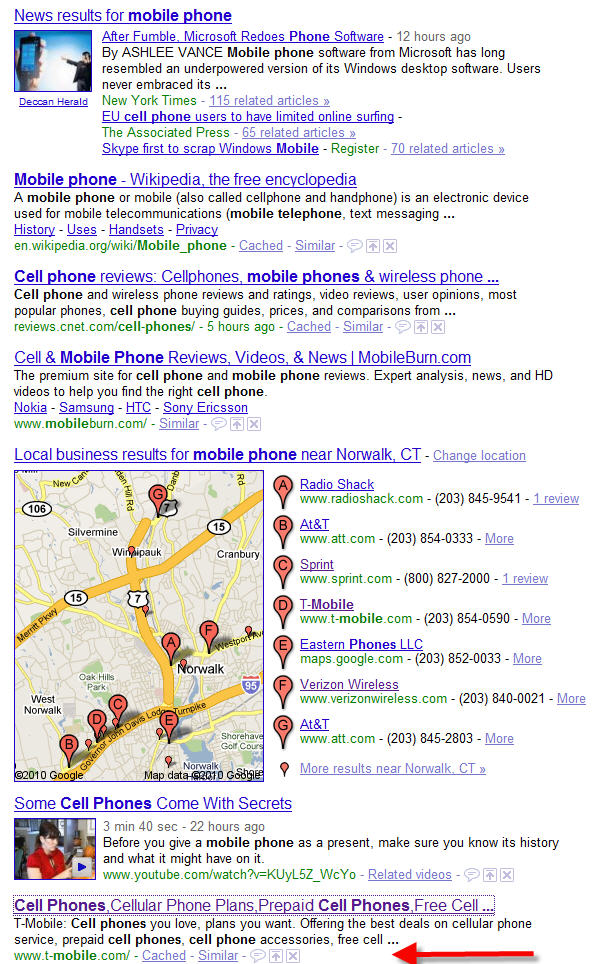In the blink of an eye a company can become invisible on a search engine due to an algorithm or policy change and in the process they can lose millions of dollars or more.
Last month an internet marketing company Quinstreet went public and within the prospectus you can find the following warning:
Our approaches may be deemed similar to those of our competitors and others in our industry that Internet search websites may consider to be unsuitable or unattractive. Internet search websites could deem our content to be unsuitable or below standards or less attractive or worthy than those of other or competing websites. In either such case, our websites may receive less favorable placement. Any reduction in the number of visitors to our websites would negatively affect our ability to earn revenue. If visits to our websites decrease, we may need to resort to more costly sources to replace lost visitors, and such increased expense could adversely affect our business and profitability.
To paraphrase a bit, we aren’t in control of our own destiny and Quinstreet is no different than most companies (including TMC) who will likely need similar terminology in the warning sections of their prospectuses. We all know the word Google could have been interchanged with “internet search Web sites” above and the public at large would probably not even notice. Google becoming synonymous with the word search is both good and bad for the company.
Recently, in response to not being paid for advertising, Google filed a lawsuit against myTriggers.com, a buying directory with a relatively low Alexa ranking of just 471,452 (1 is best) and in response received a 24-page antitrust lawsuit against Google. Yikes.
According to the Wall Street Journal, Google believes Microsoft is behind this lawsuit and moreover is responsible for the creation and funding of Initiative for a Competitive Online Marketplace, or ICOMP which is an organization which puts out papers explaining that Google manipulates search results to its own advantage and in a way which hurts its competition.
Microsoft seems to deny involvement in some or all of these activities.
The challenge for Google of course is it has gotten itself into so many areas of the market such as office software, cell phones, email, telephone service, voicemail transcription, etc – any time it has a search algorithm change which rearranges search results in a space it plays, it is by definition hurting a competitor. Moreover, the company closely guards its algorithms meaning a court case may be the only way to find out if Google is acting maliciously in case after case.
Indeed, Google has been criticized for not generating much revenue in any business beyond search; the reality may be that as the company becomes successful displacing companies in more areas, these organizations will retaliate with lawsuits which revolve around search rankings.
Out of curiosity I did a search on mobile phone and the first result (excluding local results) which is a carrier or mobile phone company is T-Mobile. See the red arrow below for details. T-Mobile is far from the most popular carrier in the US… Wouldn’t it make more sense for Verizon or AT&T to rank higher? Is it a coincidence that T-Mobile is the carrier with whom Google has a strong relationship?

It is obvious that it is easy to show ways in which Google is acting in an anticompetitive or unfair manner but difficult to prove the company is acting fairly.
The war has gone into the blogosphere where Microsoft and Google are battling for the hearts and minds of people who actually read public policy blogs. Hey I do this for a living – I am not sure why anyone else would read this stuff. Seriously though, these blogs are the fodder for the mainstream media who are forming opinions about this situation. In addition, government agencies are probably trolling these sites and using them in their decision making regarding antitrust enforcement actions.
Here are some excerpts of recent posts from both sides of the search monopoly argument:
Microsoft’s Dave Heiner recently wrote:
Government competition agencies are increasingly focused on Google’s growing power in search and online advertising. The U.S. Federal Trade Commission, the U.S. Department of Justice and the European Commission have all determined that Google is dominant in certain markets, including search advertising. In late 2008 the DOJ was prepared to go to court to block Google’s attempt to partner with its largest search rival, Yahoo!. Last year the DOJ told a federal court that Google’s book search plan is anticompetitive in several respects. (One big problem is that Google would help itself to essentially exclusive rights to tens of millions of books–effectively locking out everyone else.) Last week the DOJ reiterated that view in court, even after Google had an opportunity to address the DOJ’s concerns. This week came news that the European Commission is investigating various aspects of Google’s conduct, including claims of retaliation, exclusivity and manipulation of search results to disadvantage rivals. The European Commission is likely to treat these cases quite seriously, given that Google’s share of search and search advertising is north of 95% in many European countries.
Google’s public response to this growing regulatory concern has been to point elsewhere–at Microsoft. Google is telling reporters that antitrust concerns about search are not real because some of the complaints come from one of its last remaining search competitors.
Here is the concluding paragraph – in-between there is some interesting talk of discussions Microsoft has had with the DOJ and European Commission regarding Google as they discussed their search deal with Yahoo.
Microsoft would obviously be among the first to say that leading firms should not be punished for their success. Nor should firms be punished just because a particular business practice may harm a rival–competition on the merits can do that, too. That is a position that Microsoft has long espoused, and we’re sticking to it. Our concerns relate only to Google practices that tend to lock in business partners and content (like Google Books) and exclude competitors, thereby undermining competition more broadly. Ultimately the competition law agencies will have to decide whether or not Google’s practices should be seen as illegal.
Julia Holtz, Senior Competition Counsel at Google has this to say in a post whose title really shows the defensive position Google is now in – Committed to competing fairly. The links below were added by her, not me.
As Google has grown, we’ve not surprisingly faced more questions about our role in the advertising ecosystem and our overall approach to competition. This kind of scrutiny goes with the territory when
you are a large company. However, we’ve always worked hard to ensure that our success is earned the right way — through technological innovation and great products, rather than by locking in our users or advertisers, or creating artificial barriers to entry.
The European Commission has notified us that it has received complaints from three companies: a UK price comparison site, Foundem, a French legal search engine called ejustice.fr, and Microsoft’s Ciao! from Bing. While we will be providing feedback and additional information on these complaints, we are confident that our business operates in the interests of users and partners, as well as in line with European competition law.
Given that these complaints will generate interest in the media, we wanted to provide some background to them. First, search. Foundem – a member of an organisation called ICOMP which is funded partly by Microsoft – argues that our algorithms demote their site in our results because they are a vertical search engine and so a direct competitor to Google. ejustice.fr’s complaint seems to echo these concerns.
We understand how important rankings can be to websites, especially commercial ones, because a higher ranking typically drives higher volumes of traffic. We are also the first to admit that our search is not perfect, but it’s a very hard computer science problem to crack. Imagine having to rank the 272 million possible results for a popular query like the iPod on a 14 by 12 screen computer screen in just a few milliseconds. It’s a challenge we face millions of times each day.
It is clear that Microsoft has more recent experience at the antitrust game than just about any other company – especially in the tech world. And they are now taking this experience and using it to fight Google via global regulatory bodies. Moreover, they seem to be getting involved in more conflicts which other companies are having with Google. This puts them in a greater position to understand all the ways Google may or may not be acting in a manner which could be deemed unfair by regulators.
The one certainty is if enough companies who are being hurt by Google band together looking for ways in which the company is acting in an anticompetitive manner, eventually they could win a case which requires Google to change its business practices or break up. And this is of great concern to the search leader who has to deal with antitrust distractions as it becomes ever-more powerful.
There are certainly some negatives associated with having your company name used synonymously with search but it would seem this is a better alternative than having it be synonymous with monopoly.





